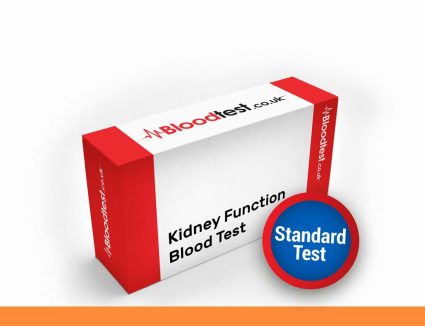In-Depth Exploration of Kidney Function and Its Crucial Role in Health
Uncover the Essential Functions of Your Kidneys for Optimal Wellbeing

The Kidney Blood Test in Sheffield stands as a vital diagnostic instrument, given that kidneys serve as fundamental organs tasked with a plethora of functions essential for sustaining overall health and wellbeing. These extraordinary organs are pivotal in filtering out waste materials and surplus fluids from the bloodstream, thereby preventing harmful substances from reaching toxic levels. This intricate filtration process is indispensable for maintaining homeostasis, ensuring a balance of crucial electrolytes such as sodium and potassium, which are vital for numerous physiological functions. Furthermore, kidneys significantly influence blood pressure regulation through the sophisticated renin-angiotensin-aldosterone system, carefully managing the volume of blood circulating within the body. This regulation holds particular significance when considering hypertension, as the efficiency of kidney function can directly impact cardiovascular health.
Beyond their filtration responsibilities, the kidneys play a crucial role in producing hormones, especially erythropoietin, which is vital for stimulating the production of red blood cells. Additionally, they convert vitamin D into its active form, enhancing calcium absorption and fostering bone health. Routine monitoring of kidney function through a kidney blood test in Sheffield is critical for early identification of potential issues, thereby ensuring that these essential organ systems are performing optimally.
How to Recognise Early Indicators of Kidney Dysfunction for Timely Action
Recognising the early indicators of kidney problems is vital for preventing serious health complications from arising. Common signs might include persistent fatigue, frequently stemming from anaemia or the accumulation of toxins within the bloodstream. Noticeable swelling in the legs, ankles, or around the eyes may indicate fluid retention, suggesting that the kidneys are not efficiently filtering waste. Changes in urination patterns—such as increased urgency, frequency, or decreased urine output—can also serve as warning signs of kidney distress. Additionally, elevated blood pressure is closely associated with kidney function; when the kidneys struggle to maintain equilibrium, blood pressure levels may spike.
If you observe any of these troubling symptoms, it is crucial to consult a healthcare professional, who may recommend a kidney blood test in Sheffield. Early intervention is paramount for improving outcomes and effectively managing potential kidney diseases, making it essential to take these symptoms seriously.
Are You Ready to Delve into Your Kidney Health?
 Recognising the Importance of Regular Kidney Testing for Optimal Health Maintenance
Recognising the Importance of Regular Kidney Testing for Optimal Health Maintenance
Regular kidney function testing is not exclusive to individuals with pre-existing health issues; it is a proactive measure that everyone should incorporate into their healthcare routines. Kidney disease often progresses quietly, with few noticeable symptoms until significant damage has occurred. Routine blood tests can reveal shifts in critical markers such as creatinine, urea, and electrolytes, facilitating timely interventions. This is particularly vital for those at heightened risk due to conditions like diabetes, hypertension, or a familial predisposition to kidney disorders.
A kidney blood test in Sheffield provides a clear assessment of your kidney functionality, allowing healthcare professionals to formulate appropriate management strategies or recommend lifestyle adjustments. The sooner any potential issues are detected, the more effective treatment options become, ultimately promoting long-term health outcomes and wellbeing.
Key Lifestyle Factors Influencing Kidney Health

Your kidney health is significantly shaped by various lifestyle choices and environmental influences. A diet high in processed foods and sodium puts undue stress on the kidneys, potentially leading to progressive impairment over time. In contrast, a well-balanced diet abundant in fruits, vegetables, and whole grains bolsters kidney health and functionality. Staying adequately hydrated is vital; water is essential for the kidneys to effectively eliminate toxins and maintain peak performance.
Moreover, engaging in regular physical activity is crucial for sustaining kidney health. Exercise enhances blood circulation, lowers blood pressure, and aids in managing blood sugar levels, all of which are critical for preserving kidney function. Additionally, avoiding detrimental habits such as smoking and excessive alcohol consumption can lead to considerable improvements in kidney health. A comprehensive approach to kidney wellness acknowledges these interconnected factors, and routine testing—including a kidney blood test in Sheffield—is a fundamental component of this strategy.
Thorough Overview of Kidney Blood Testing and Its Significance
A Comprehensive Analysis of the Blood Urea Nitrogen (BUN) Test
The Blood Urea Nitrogen (BUN) test serves as a crucial diagnostic instrument for evaluating kidney function. This test measures the concentration of urea nitrogen in the blood, a waste product generated during protein metabolism. In individuals with healthy kidneys, these organs effectively filter out urea, maintaining stable blood levels. However, elevated BUN levels can indicate compromised kidney function, suggesting the accumulation of waste products in the bloodstream.
Several factors, such as dehydration, high protein intake, or specific medications, can also influence BUN levels, making it essential to interpret results within the appropriate context. For those undergoing a kidney blood test in Sheffield, understanding your BUN levels can yield valuable insights into kidney performance and whether further investigation is warranted.
Assessing Kidney Function Through the Creatinine Test

The creatinine test is another essential element in assessing kidney function. Creatinine is a waste product created by muscles during the breakdown of creatine, which plays a vital role in energy production. Healthy kidneys filter creatinine efficiently from the blood, and its levels can provide insights into kidney efficiency. Elevated creatinine levels often indicate that the kidneys are not functioning optimally, necessitating further investigation.
When you undergo a kidney blood test in Sheffield, your healthcare provider may examine your creatinine levels alongside other relevant markers to gain a comprehensive understanding of your kidney health. It is crucial to consider factors such as muscle mass, age, and gender, as these can significantly affect baseline creatinine levels. Abnormal results may necessitate additional testing or lifestyle adjustments to safeguard kidney function.
Understanding Kidney Function Through Glomerular Filtration Rate (GFR)
The Glomerular Filtration Rate (GFR) is a vital indicator of kidney function, offering a detailed view of how effectively the kidneys filter blood over time. GFR calculations consider age, gender, and serum creatinine levels, enabling standardized evaluations of kidney performance. A normal GFR reflects healthy kidney function, while a reduced rate may signify the onset of kidney disease or dysfunction.
Comprehending your GFR results from a kidney blood test in Sheffield empowers you to take an active role in managing your kidney health. Regular monitoring of GFR can help track changes in kidney function, making it an indispensable tool for the early detection and effective management of potential issues. If your GFR falls below normal ranges, your healthcare provider may recommend lifestyle modifications or further tests to explore underlying causes.
Essential Preparations for a Successful Kidney Blood Test
Key Pre-Test Guidelines to Ensure Accurate Results
Preparing for a kidney blood test is a straightforward yet crucial process that guarantees accurate results. Your healthcare provider may recommend fasting for a specific duration, typically overnight, prior to the test. This fasting period helps prevent food intake from skewing your blood levels of substances such as creatinine and urea. Additionally, it is essential to inform your doctor about any medications or supplements you are taking, as some can potentially influence test outcomes.
If you have underlying health conditions like diabetes, it is critical to discuss how to manage these issues leading up to your kidney blood test in Sheffield. Proper preparation can significantly enhance the accuracy of your results, providing your healthcare team with the necessary information to evaluate your kidney function effectively.
What Can You Expect During the Kidney Blood Testing Procedure?
During your kidney blood test, expect a straightforward procedure that typically lasts only a few minutes. A trained healthcare professional will draw a small volume of blood, usually from a vein in your arm. While you might feel a brief sting or pinch during the needle insertion, the procedure is generally quick and well-tolerated by most individuals.
Once the blood is drawn, the sample will be sent to a laboratory for analysis. Consequently, you won’t receive immediate results; however, your healthcare provider will discuss the findings with you during a follow-up appointment. Understanding what to expect can help alleviate any anxiety associated with the kidney blood test in Sheffield, ensuring you feel prepared and comfortable throughout the experience.
Guidelines for Recovery Following Your Kidney Blood Test
After completing your kidney blood test, please adhere to these specific recommendations. Generally, you can resume your usual activities immediately. However, it is advisable to avoid strenuous physical exertion for the remainder of the day, particularly if you notice any tenderness at the site where blood was drawn. Bruising is common but typically resolves within a few days without further complications.
If you experience excessive pain, swelling, or any unusual symptoms at the puncture site, it is wise to contact your healthcare provider. Following your kidney blood test in Sheffield, be sure to schedule a follow-up appointment to discuss the results and their implications for your kidney health moving forward.
Accessing Kidney Testing Services in Sheffield
Comprehensive Kidney Testing Services Available at NHS Hospitals
Sheffield boasts several NHS hospitals that provide extensive kidney blood testing services as part of routine health assessments or specialist referrals. Major healthcare facilities in the area, such as the Northern General Hospital and the Royal Hallamshire Hospital, feature well-equipped laboratories capable of efficiently conducting kidney function tests.
Patients can typically access these essential tests through their General Practitioner (GP), who may recommend blood tests based on individual health concerns or risk factors. NHS testing serves as an invaluable resource, ensuring that residents have access to necessary health screenings without incurring exorbitant costs.
If you’re contemplating a kidney blood test in Sheffield, consulting your GP is an excellent first step toward accessing the services available through NHS facilities.
Private Clinics Offering Convenient Kidney Testing Solutions
For those seeking quicker or more discreet options, several private clinics in Sheffield provide kidney blood testing services. These facilities often deliver a streamlined experience, characterised by shorter wait times and the flexibility to secure appointments that accommodate your schedule. Many private clinics also prioritise confidentiality, ensuring that sensitive health information is well-protected.
In addition to kidney testing, private clinics may offer supplementary services, such as comprehensive health assessments or follow-up consultations to discuss results in detail. While these services typically incur a fee, the peace of mind and convenience they provide are appealing to many individuals. If you prefer a private setting for your kidney blood test in Sheffield, researching local clinics can help you identify options that meet your needs.
GP Surgeries Providing Kidney Blood Testing Services
Numerous GP surgeries throughout Sheffield conduct kidney blood tests as part of routine health screenings or when specific symptoms emerge. These tests are often integrated into broader health evaluations, enabling healthcare professionals to monitor kidney health alongside other vital metrics. If you have concerns regarding your kidney function or possess risk factors such as diabetes or hypertension, it is prudent to discuss testing options with your GP.
Cost-effective and accessible, obtaining a kidney blood test in Sheffield through your GP is an excellent way to stay informed about your health status. Regular screenings can uncover issues early, paving the way for proactive management and promoting long-term wellness.
Understanding and Interpreting Your Kidney Blood Test Results
Normal Ranges for Key Kidney Function Tests You Should Know
Grasping the normal ranges for kidney blood tests is essential for accurately interpreting your results. Typically, Blood Urea Nitrogen (BUN) values range from 7 to 20 mg/dL, while creatinine levels are generally expected to fall between 0.6 and 1.2 mg/dL for adults. The Glomerular Filtration Rate (GFR), recognised as a more comprehensive measure, should ideally exceed 90 mL/min/1.73m².
These ranges can fluctuate based on factors such as age, gender, and individual health conditions; thus, discussing your results with a healthcare professional is crucial. Regular monitoring of these parameters via a kidney blood test in Sheffield can help establish a baseline for your health, facilitating the identification of any deviations from the norm and allowing for timely interventions.
How to Interpret Abnormal Results for Effective Health Management
If your kidney blood test reveals abnormal results, understanding the implications for your health is paramount. Elevated levels of BUN or creatinine may indicate kidney dysfunction, while a decreased GFR can suggest diminished kidney efficiency. However, abnormal results do not inevitably signal severe kidney disease; various factors, including hydration status and dietary habits, can also influence these markers.
If your results raise concerns, your healthcare provider may recommend further tests or follow-ups to gain a clearer understanding of the underlying causes. It is crucial to take these findings seriously and collaborate with a professional to develop a monitoring and management plan, especially if you are undergoing a kidney blood test in Sheffield as part of a comprehensive health strategy.
Engaging in Constructive Discussions with Your Doctor About Your Test Results
Once you have received your kidney blood test results, scheduling a follow-up appointment with your doctor is essential. This discussion provides an opportunity to delve into your findings, comprehend their implications, and outline any necessary next steps. Your healthcare provider can clarify what your results signify and whether they necessitate further testing or lifestyle modifications.
Open communication is crucial; do not hesitate to ask questions or express any concerns regarding your kidney health. Gaining clarity on your results empowers you to make informed decisions, ultimately leading to better health outcomes in the long run. Proactive discussions about your health following a kidney blood test in Sheffield can pave the way for improved management and sustained kidney function.
The Importance of Regular Monitoring and Follow-Up Testing for Kidney Health
<pRegular monitoring of kidney function is imperative, particularly for individuals with risk factors such as diabetes, hypertension, or a family history of kidney disease. Your healthcare provider may recommend follow-up tests based on your initial results to track any changes in kidney performance over time. This continual monitoring is crucial for early detection of potential issues, allowing for timely interventions.
Discussing with your doctor how frequently you should undergo a kidney blood test in Sheffield, based on your risk factors, is wise. Consistent testing can provide reassurance and help address any concerns before they escalate into more significant health challenges.
Effective Strategies for Managing Kidney Health
Optimising Your Diet and Nutrition for Enhanced Kidney Health
Your diet plays a pivotal role in maintaining kidney health. A balanced diet that is low in salt and processed foods can significantly reduce the strain on the kidneys. Prioritising the inclusion of fresh fruits, vegetables, whole grains, and lean proteins in your meals is critical for optimal kidney function. Foods rich in antioxidants, such as berries and leafy greens, can help combat oxidative stress and support overall kidney performance.
For individuals with pre-existing kidney conditions, collaborating with a healthcare provider or a registered dietitian to develop a personalised nutritional plan is vital. This may involve monitoring potassium and phosphorus intake, as imbalances in these minerals can exacerbate kidney problems. A proactive dietary approach, combined with regular kidney blood tests in Sheffield, can significantly enhance overall kidney health and reduce the risk of complications.
The Critical Importance of Proper Hydration in Supporting Kidney Function
Hydration is paramount for optimal kidney health. Consuming adequate amounts of water is vital for flushing out toxins and maintaining efficient kidney function. Dehydration can lead to concentrated urine, increasing the likelihood of kidney stones and other complications. The necessary amount of water can vary based on individual factors, including activity levels, climate, and overall health.
Implementing simple strategies to promote better hydration, such as carrying a water bottle and setting reminders to drink throughout the day, can be beneficial. Furthermore, incorporating hydrating foods like cucumbers and watermelon can also contribute to your overall fluid intake. When considering your kidney health, remember that proper hydration forms a fundamental aspect of effective maintenance and management, especially if you are preparing for a kidney blood test in Sheffield.
The Vital Importance of Regular Check-Ups for Ongoing Kidney Health
Regular check-ups are crucial for proactive kidney health management. If you possess risk factors such as diabetes or hypertension, scheduling kidney function tests should be an integral aspect of your healthcare routine. These evaluations can help identify shifts in kidney performance early, facilitating immediate intervention when necessary.
Discussing the frequency of kidney blood tests with your healthcare provider in Sheffield will help establish a monitoring plan that aligns with your specific health needs. Regular assessments not only offer peace of mind but also equip you with the necessary knowledge to make informed lifestyle choices that benefit your kidney health.
Incorporating Regular Exercise into Your Kidney Health Regimen
Engaging in regular physical activity can have a profoundly positive impact on kidney function and overall health. Exercise helps regulate blood pressure and blood sugar levels, both of which are crucial in preventing kidney disease. Aim for a balanced routine that includes aerobic exercises, such as walking or cycling, combined with strength training to promote cardiovascular health and muscle integrity.
Establishing a sustainable exercise regimen can elevate your mood and energy levels, contributing to a general sense of wellbeing. Whether you choose to join a local gym, explore hiking trails, or enjoy invigorating walks in Sheffield’s scenic parks, finding an enjoyable activity can keep you committed to your fitness goals.
Integrating regular physical activity into your lifestyle can significantly enhance kidney health and overall wellness, complementing the insights gained from your kidney blood tests in Sheffield.
Current Overview of Kidney Disease in the United Kingdom
Statistics and Prevalence of Kidney Disease Across the UK
Kidney disease represents a significant health challenge in the UK, impacting a considerable segment of the population. Recent statistics reveal that approximately 3 million individuals nationwide are living with chronic kidney disease (CKD), many of whom remain unaware of their condition. Certain demographics, including older adults and individuals with diabetes or hypertension, face an elevated risk of developing kidney issues.
Raising awareness and facilitating early detection are crucial, as many individuals can sustain diminished kidney function for years without exhibiting substantial symptoms. Routine screenings, including kidney blood tests in Sheffield, can promote early identification and management, ultimately reducing the burden of kidney disease on affected individuals and the healthcare system as a whole.
Recognising Risk Factors for Kidney Disease and Their Management
Numerous risk factors contribute to the development of kidney disease, underscoring the importance of awareness and proactive management. Diabetes and high blood pressure are the leading causes of CKD in the UK, significantly increasing the likelihood of kidney damage over time. Additional contributing factors include family history, advancing age, and lifestyle choices such as diet and physical activity.
Understanding these risk factors empowers individuals to adopt preventive measures, such as maintaining a healthy weight, following a balanced diet, and engaging in regular physical activity. If you identify with any risk factors for kidney disease, discussing them with your healthcare provider can facilitate a personalised health strategy, including the necessity for regular kidney blood tests in Sheffield.
Frequently Asked Questions Regarding Kidney Health and Testing Procedures
What is a kidney blood test, and why is it critical?
A kidney blood test evaluates specific substances in your bloodstream, including creatinine, urea nitrogen, and electrolytes, to assess the efficiency of your kidneys.
How often should I have a kidney blood test conducted?
The recommended frequency varies based on individual risk factors; however, regular testing is advised for those with diabetes, hypertension, or a family history of kidney disease. Consult your healthcare provider for tailored recommendations.
Are there any risks associated with having a kidney blood test?
The associated risks are minimal; some individuals may experience slight bruising or discomfort at the site where blood was drawn. Serious complications are extremely rare.
Can I eat or drink before my kidney blood test?
Your healthcare provider may recommend fasting prior to the test to ensure accurate results. Always adhere to their specific instructions for preparation.
What do abnormal kidney blood test results signify?
Abnormal results may suggest impaired kidney function or other health concerns. It is essential to discuss your results with your healthcare provider for thorough interpretation.
How can I effectively monitor my kidney health?
Monitoring kidney health can be achieved through regular blood tests, urine tests, and evaluations of risk factors. Consistent check-ups with your healthcare provider are crucial for maintaining kidney health.
What lifestyle changes can enhance kidney health?
Adopting a balanced diet, staying properly hydrated, engaging in regular physical activity, refraining from smoking, and moderating alcohol intake can significantly improve kidney health.
What symptoms should I be aware of as warning signs of kidney disease?
Warning signs may include persistent fatigue, swelling, changes in urination patterns, and elevated blood pressure. Early detection through testing is critical for effective management.
Where can I access a kidney blood test in Sheffield?
Kidney blood tests are available at NHS hospitals, private clinics, or your local GP surgery throughout Sheffield, providing various options for testing.
What steps should I take if diagnosed with kidney disease?
If you are diagnosed with kidney disease, collaborate closely with your healthcare provider to create a personalised management plan that may include lifestyle adjustments, regular monitoring, and potentially medication.
Connect with us on Facebook for more information!
This Article Was First Found On https://bloodtest.co.uk
The Article Kidney Blood Test Guide for Sheffield Residents Was Found On https://limitsofstrategy.com



